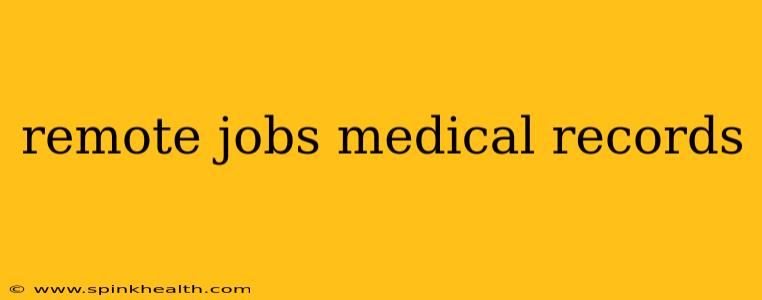The world of healthcare is evolving, and with it, the opportunities for remote work. If you're seeking a career in medical records with the flexibility of working from home, you're in luck! This comprehensive guide will delve into the exciting possibilities of remote medical records jobs, exploring the different roles available, the skills you'll need, and how to land your dream position.
Imagine this: you wake up, enjoy a leisurely breakfast, and then settle into your home office to start your day reviewing medical records. No more rush-hour commutes or strict office hours – this is the reality for many professionals working remotely in the medical records field. But it's not just about convenience; it's about making a real difference in healthcare, all from the comfort of your own home.
What are the Different Types of Remote Medical Records Jobs?
The beauty of remote work in medical records is the diversity of roles available. It's not a one-size-fits-all scenario. Let's explore some of the popular options:
Medical Records Technician (Remote)
This is a foundational role, often the entry point for many. Remote medical records technicians are responsible for:
- Charting and data entry: Accurately inputting patient information into electronic health records (EHRs).
- Maintaining patient records: Ensuring the accuracy, completeness, and confidentiality of medical records.
- Coding and abstracting data: Assigning medical codes (like ICD-10 and CPT) to diagnoses and procedures.
Remote Medical Coder
Specializing in medical coding, these professionals translate medical diagnoses, procedures, and services into numerical codes used for billing and data analysis. Strong understanding of coding systems (ICD-10, CPT, HCPCS) is crucial.
Remote Medical Biller
Similar to coding, billing focuses on the financial side. Remote medical billers prepare and submit claims to insurance companies, manage accounts receivable, and follow up on outstanding payments. A deep understanding of medical billing practices is essential.
Remote Health Information Manager (HIM)
This is a more advanced role, requiring significant experience and expertise. Remote HIM professionals oversee the entire medical records process, ensuring compliance with regulations (like HIPAA), implementing best practices, and managing teams of coders and technicians.
What Skills Are Needed for Remote Medical Records Jobs?
While specific requirements vary by role, several key skills are consistently sought after:
- Proficiency with EHR software: Familiarity with common EHR systems is paramount.
- Medical terminology: A strong grasp of medical terminology is indispensable.
- Data entry skills: Accuracy and speed in data entry are critical.
- Medical coding knowledge (for coders and technicians): Understanding ICD-10, CPT, and HCPCS is essential.
- Strong organizational skills: Managing multiple tasks and deadlines effectively is vital.
- Attention to detail: Accuracy is crucial in medical records.
- Confidentiality and HIPAA compliance: Strict adherence to privacy regulations is non-negotiable.
How to Find Remote Medical Records Jobs?
The hunt for the perfect remote job can feel overwhelming. Here’s a structured approach:
- Online job boards: Indeed, LinkedIn, and specialized healthcare job boards are excellent resources.
- Company websites: Directly search the careers pages of healthcare organizations known for remote work opportunities.
- Networking: Leverage your professional network; let people know you're looking for remote medical records positions.
- Freelance platforms: Consider platforms like Upwork or Fiverr for short-term or project-based work.
What are the Benefits of Remote Medical Records Jobs?
The advantages extend beyond the flexibility:
- Work-life balance: Enjoy a better balance between your professional and personal life.
- Geographic flexibility: Work from anywhere with a stable internet connection.
- Reduced commute: Save time and money on commuting.
- Increased job satisfaction: Many find remote work more fulfilling.
What are the Challenges of Remote Medical Records Jobs?
While rewarding, remote work in medical records also presents some challenges:
- Maintaining work-life balance: It’s important to set boundaries and avoid blurring the lines between work and personal life.
- Technological issues: Reliable internet and equipment are essential.
- Isolation: Some might find working from home isolating, requiring proactive efforts to maintain social connections.
- HIPAA compliance: Maintaining HIPAA compliance in a remote setting requires extra vigilance.
This journey into the world of remote medical records jobs provides a solid foundation for your exploration. Remember that with the right skills and preparation, you can find a rewarding and flexible career in this ever-growing field. Good luck!

